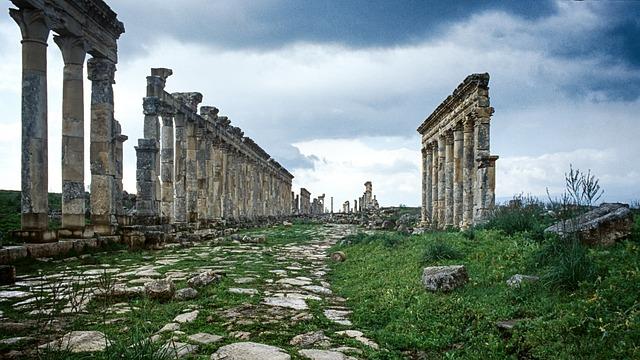As the Syrian conflict enters its crucial phases, the future of national dialogue in the war-torn nation hangs in the balance. The anticipated national dialogue conference, envisioned as a platform for inclusive discussions aimed at addressing the multifaceted crises plaguing Syria, faces growing uncertainty.Stakeholders from various factions, including the Syrian government, opposition groups, and representatives from civil society, remain divided on crucial issues, raising questions about the feasibility of constructive dialogue. With international dynamics evolving and regional powers recalibrating their strategies, the conference’s overall effectiveness in forging a path towards peace and stability remains ambiguous. This article delves into the complexities surrounding the national dialogue conference, exploring its potential impact on Syria’s future and the obstacles that threaten to undermine this critical initiative.
syria’s National Dialogue Conference: An Overview of Current Developments

The ongoing National Dialogue Conference in Syria has entered a critical phase as multiple stakeholders grapple with diverging objectives and mounting tensions.Despite initial optimism surrounding the dialogues,the complexities of Syria’s multi-faceted conflict have created a landscape where consensus remains elusive. Key players in the government, opposition, and civil society are engaging in discussions, yet significant challenges persist:
Differences in agendas among various factions, leading to stalled negotiations.
Distrust among participants, stemming from years of conflict and differing political ideologies.
Pressure from international actors with competing interests in the region.
Recent reports indicate that grassroots movements within Syria are advocating for a more inclusive dialogue framework, emphasizing the need for local representation and a focus on humanitarian issues. However, a lack of unified strategic vision continues to hinder progress. The following table highlights the primary concerns shared by participants in the conference:
Concern
Description
Human Rights Violations
Calls for accountability regarding past abuses need to be addressed.
political Representation
equal involvement of all groups, especially marginalized communities, is crucial.
Economic Recovery
Strategies for rebuilding the economy must be prioritized in discussions.
Key Stakeholders and Their Positions in the Syrian Dialogue Process

In the intricate tapestry of Syria’s national dialogue process, several key stakeholders play pivotal roles, each representing unique interests and perspectives. Among these, the Syrian government, led by President Bashar al-Assad, aims to consolidate power and strengthen its position post-conflict, thereby pursuing a dialogue that reinforces its legitimacy. Contrastingly, the opposition groups, comprising various political factions and armed rebel entities, demand significant reforms, greater autonomy, and accountability from the current regime. Their fragmented nature complicates unity within the opposition, leading to divergent agendas and complicating negotiations.
International actors also significantly influence the dialogue. The United States and European Union advocate for a political resolution rooted in democratic principles, pressing for human rights considerations alongside any reform agenda. Meanwhile,Russia and Iran are staunch supporters of the Assad government,seeking to maintain their geopolitical interests in the region. Other regional players, such as Turkey, express concerns over the Kurdish movements and aim to curtail their influence, injecting another layer of complexity into the dialogue dynamics.Together, these stakeholders create a multilayered habitat for negotiations, where the interplay of their respective ambitions and fears shapes the future of Syria.
Challenges and Obstacles Facing the National Dialogue Initiative

The path toward accomplished reconciliation in Syria is fraught with various challenges and obstacles that threaten the viability of the national dialogue initiative. A primary issue remains the deep-seated sectarian divisions among different ethnic and religious groups. Such divisions frequently enough lead to mutual distrust, making it difficult to establish a common ground for meaningful dialogue.Additionally, ongoing hostilities between rival factions continue to undermine any progress, with sporadic violence acting as a constant reminder of the war-torn nation’s fragility.
Moreover, the political landscape in Syria complicates efforts to unify the various stakeholders involved in the dialogue. The presence of multiple external actors, each with their own interests and agendas, exacerbates the situation. International support is frequently enough conditional and fragmented,leading to inconsistent backing for the dialogue process. The following factors hinder advancements:
complexity of alliances: rivalries among local and international players create an unpredictable environment.
Lack of trust: Previous failed negotiations have eroded confidence in the dialogue’s potential.
Humanitarian crises: Ongoing displacement and humanitarian needs divert attention and resources.
Implications for Regional Stability and International relations

The ongoing uncertainty surrounding Syria’s national dialogue conference has significant. As multiple factions vie for power and influence, the lack of a cohesive dialogue process may exacerbate ongoing conflicts and lead to further fragmentation. The ramifications coudl cascade beyond Syria’s borders, destabilizing neighboring countries and drawing in regional powers who have vested interests in the outcome of these discussions. In this context, a few key points are crucial to consider:
Increased Proxy Conflicts: The unresolved status of the conference could lead to intensified proxy wars as external powers support differing factions within syria.
Humanitarian Crisis Escalation: Continued instability hampers international aid efforts, worsening the humanitarian situation for millions.
Migration Pressures: A prolonged conflict may trigger further waves of refugees, destabilizing host countries and altering demographic balances throughout the region.
The international community’s response to the evolving situation will also be crucial. Major powers must navigate the complexities of their relationships with regional actors while fostering dialogue that includes all key stakeholders. Failure to establish a functional negotiation framework could diminish the credibility of international efforts and fuel skepticism toward diplomatic initiatives.Significant factors affecting international relations include:
Influencing Countries
Key Interests
United States
Counterterrorism and democratization efforts
Russia
Maintaining influence and military presence
Turkey
Security against Kurdish forces and regional stability
Iran
Establishing a regional foothold and supporting allies
Recommendations for a More Effective Dialogue Framework

Building a more effective dialogue framework necessitates harnessing diverse perspectives and fostering inclusivity. Stakeholders must prioritize the following approaches:
Encourage Grassroots Participation: Engaging local communities will ensure that the dialogue reflects the true sentiments and aspirations of the Syrian populace.
Utilize Mediated Platforms: independent mediators can help bridge divides between conflicting parties,enhancing understanding and respect for differing viewpoints.
Establish Clear Objectives: Defining short-term and long-term goals for the dialogue will guide discussions and keep all parties focused on tangible outcomes.
Moreover, implementing structured dialogues can provide a clearer path forward. this structure might include:
Dialogue Element
Description
Regular Sessions
Scheduled discussions that facilitate ongoing dialogue and relationship-building.
Feedback Mechanisms
Channels for participants to express their thoughts and concerns, fostering a sense of ownership in the process.
Follow-up Commitments
Certainly, all parties should outline their responsibilities and ensure accountability in the implementation of agreements reached.
Potential Outcomes and Future Scenarios for Syria’s Political Landscape

the ongoing national dialogue conference in Syria remains shrouded in uncertainty, with various factions vying for dominance. Potential outcomes may include a spectrum of scenarios that could reshape the political fabric of the nation.Among these are:
Increased Fragmentation: A lack of consensus could lead to further divisions among existing political bodies,intensifying sectarian tensions.
Strengthened Authoritarianism: The current regime might tighten its grip, suppressing dissent and marginalizing opposition voices.
Emergence of New Alliances: If compromises are reached, we may witness the formation of new political coalitions aimed at implementing a transitional governance model.
As discussions unfold,regional and international influences are poised to play a critical role in steering Syria’s future.Key factors to watch include:
Factor
Potential Impact
Foreign Intervention
Could either stabilize or further complicate the conflict depending on the interests of involved nations.
Humanitarian Crisis
Continued suffering may galvanize domestic and international pressure for reform.
Economic Conditions
A deteriorating economy could lead to unrest, affecting the overall political climate and dialogue prospects.
In Conclusion
As the fate of Syria’s national dialogue conference hangs in the balance, the prospects for meaningful progress towards reconciliation and stability appear increasingly fragile. The ongoing complexities of the Syrian conflict, coupled with divergent interests among key stakeholders, underscore the uncertainty that looms over any potential outcomes. While the conference aims to foster dialogue and address the myriad challenges besetting the nation, achieving a consensus among the diverse factions remains a formidable task. The international community’s role will be pivotal in facilitating constructive engagement and ensuring that the voices of all Syrians are heard. As developments unfold, the commitment to a peaceful resolution will be tested, with the hope that dialogue can pave the way for a brighter future for Syria.
Author : Asia-News
Publish date : 2025-02-22 04:08:00
Copyright for syndicated content belongs to the linked Source.